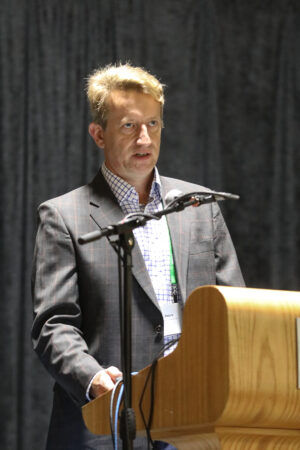 “A significant portion of the public has been convinced that ruminants are a major cause of climate change. This message has become ubiquitous; many believe in it, and we need to be able to present data that shows ruminant agriculture is one of the few ways to produce food that sequesters more carbon and is more carbon neutral than any other form of agriculture. We need transparency,” said Ruraidh Petre, Global Roundtable for Sustainable Beef executive director. Petre was a featured speaker during the 2022 Beef Improvement Federation (BIF) Symposium June 2 in Las Cruces, New Mexico.
“A significant portion of the public has been convinced that ruminants are a major cause of climate change. This message has become ubiquitous; many believe in it, and we need to be able to present data that shows ruminant agriculture is one of the few ways to produce food that sequesters more carbon and is more carbon neutral than any other form of agriculture. We need transparency,” said Ruraidh Petre, Global Roundtable for Sustainable Beef executive director. Petre was a featured speaker during the 2022 Beef Improvement Federation (BIF) Symposium June 2 in Las Cruces, New Mexico.
Petre explained the rhetoric many beef consumers have heard, the reality of how producers can improve their trust in the industry and the impact the Sustainable Beef Network will have on the global support for beef.
Rhetoric vs reality
Climate change is a major issue facing the beef industry as many consumers are convinced ruminants are the leading cause. This rhetoric and other negative messages about beef production have reduced trust in the industry. However, the facts are in favor of the beef industry; producers need to provide the data through the supply chain to create the transparency the consumer demands. The demand for beef and prices remains high but we must continue to share the message of the beef industry.
“Consumers of late are tired of being told what to eat. They want to eat beef, but they want to be reassured it’s a responsible thing to do,” Petre added.
Sustainable Beef Network
The Global Roundtable for Sustainable Beef (GRSB) a network of roundtables spanning more than 24 countries to develop the role of beef in a thriving and sustainable food system. Producers are the driving force of the roundtables because without them, there would be no action on the ground. The GRSB has three global goals focusing on climate impact, animal health and welfare, and nature positive production. They plan to achieve a 30% reduction in the intensity of carbon emissions and for the beef industry to be a net positive contributor to nature by 2030. They also focus on providing animals with an environment in which they can thrive.
“Good animal health contributes to human health through a reduction in zoonoses, as well as reducing the need for pharmaceuticals that are critical to human health, the overuse of which can lead to resistance,” Petre explained.
To watch Petre’s full presentation, visit https://youtu.be/tc0zLeSxxL8. For more information about this year’s Symposium and the Beef Improvement Federation, including additional presentations and award winners, visit BIFSymposium.com.
